Iranian Lawmaker Claims Attack on Israel Will Boost Foreign Investment

One of the few female members of the Islamic Republic parliament has said that the April 13 missile attack on Israel will unify Iranians and help attract foreign investments.

One of the few female members of the Islamic Republic parliament has said that the April 13 missile attack on Israel will unify Iranians and help attract foreign investments.
Fatemeh Mohammad Beigi, a medical doctor by training, belongs to the hardliner faction of the outgoing parliament and has been re-elected for the next four years.
“Undoubtedly, the significant feat by the Revolutionary Guard’s aerospace force against Israel has brought people's hearts closer together. In the light of this solidarity, other challenging issues in the country…can also be resolved,” Beigi told a local website. As one of the challenges, she mentioned the declining legitimacy of the Islamic government.
However, her reference to a potential increase in foreign investment contradicts recent decisions by the United States and Europe to expand sanctions on individuals and entities helping the Islamic Republic in its weapons proliferation activities and support for militant networks.
Also, contrary to her claim about stronger solidarity among the people, Many Iranians criticized the attack against Israel. Even some regime insiders and commentators warned of dire economic and security consequences.
Beigi is known for odd statements and actions. In February, during the electoral campaign for parliamentary elections she wrote a letter to the governor in her local constituency, reminding him that she is known by nice different names, and this should be considered during the counting of write-in ballots.
She provided a list of these nine names to the governor in a letter. One of these names was “Ms. Doctor”. Beigi said that if a voter simply writes “Ms. Doctor”, that would be a vote for her.
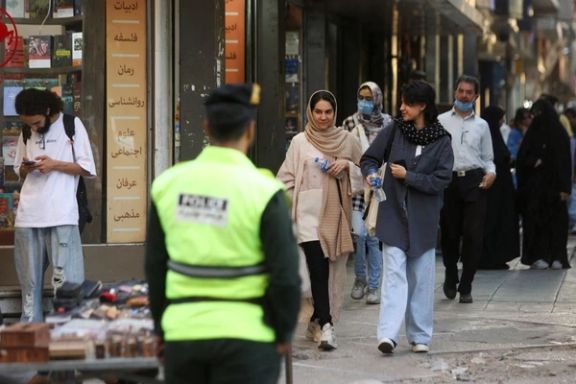
Protesters gathered at the Haft-e-Tir metro station in Tehran following the arrest of a woman over her defiance against Iran's mandatory hijab, successfully securing her release.
Eyewitnesses reported to BBC Persian that the incident began when metro security personnel stopped the woman for not adhering to the hijab law. Despite her refusal to comply with the officers' orders, a growing protest from bystanders after she was taken to a nearby room pressured the officers to release her within twenty minutes.
Political activist Mahdieh Golroo shared footage of the incident on her X account, stating that the woman was "confined in a room at the station until the public's protest led to her release."
The event comes amid renewed governmental efforts to enforce hijab regulations more strictly. On April 13, the Iranian government announced the reactivation of morality police, alongside the implementation of the Plan Noor, aimed at curbing what it deems "immodesty."
The renewed enforcement drive follows directives from Supreme Leader Ayatollah Ali Khamenei, who recently emphasized the necessity of adhering to "religious decrees" concerning the hijab, labeling non-compliance as "religious norm-breaking" activities.
The intensification of hijab enforcement in the wake of the death of Mahsa Amini in morality police custody for the inappropriate wearing of her hijab, has been met with further rebellion across society. Increased confrontations and heightened tensions across various Iranian cities have followed the uprising as the government fails to quash the nationwide refusal to be subjected to religious doctrine.
Amini's death ignited a widespread movement against the regime, marking one of the most significant challenges to the Islamic Republic since its establishment in 1979. Ongoing laws to oppress women's right to choose what to wear have been dubbed 'gender apartheid by the UN'.
The government crackdown on the uprising which followed Amini's death resulted in the deaths of at least 500 civilians and the arrest of thousands, as reported by human rights organizations. Since then, record numbers of Iranians have been executed as the regime cracks down on dissent.
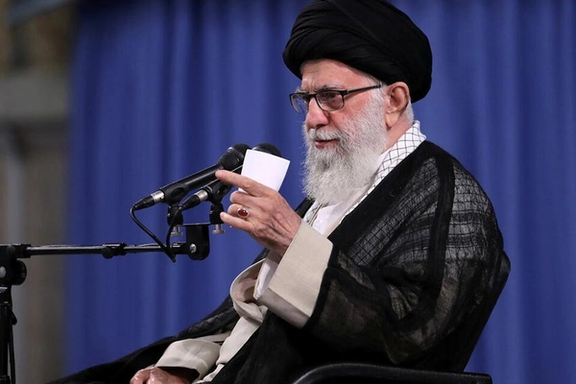
Iran's Supreme Leader Ali Khamenei reiterated his support for Palestinian terror groups and militant proxies just days after the country's aerial bombardment aimed at Iran's archenemy Israel.
"Is a Palestinian defending his home a terrorist? Are we, the resistance front, terrorists?" he said.
The comments come amid the ongoing Gaza war, triggered by Iran-backed Hamas when on October 7 thousands of its militants invaded Israel killing 1,200 mostly civilians and kidnapping over 250 more.
Iran has long funded, armed and trained Hamas and other Palestinian militant groups, spearheaded by the supreme leader in his mission to annihilate the Jewish state. Iran has proxies across the region in which the regime invests billions of dollars each year.
In his Wednesday speech, he also defended Iran's backing of Hezbollah, which is currently waging war on Israel's northern front. Over 100,000 Israelis are currently displaced after more than 3,100 projectiles have been fired into Israeli territory since October 7 in support of Hamas in Gaza.
During his speech on Wednesday, Khamenei also responded to the intensified sanctions on Iran from the EU, UK and US in the wake of the aerial bombardment, which saw over 350 drones and missiles fired towards Israel, most of which were intercepted by Israel and a US-led coalition.
"The sanctions will not bring down the Iranian nation because it does not rely on external help," he stated, in spite of the fact that over one third of Iranians now live below the poverty line as the regime funds war over feeding its people.
On Monday, EU foreign policy chief Josep Borrell announced that the new sanctions would expand the catalog of prohibited items related to drone and missile production, a move building on measures connected to Iran's role in supplying drones to Russia.
Iran claims the aerial assault was a move of self defense after an alleged Israeli air strike earlier this month on Iran's consulate in Damascus in which one senior Quds Force commander was assassinated along with several other IRGC personnel.
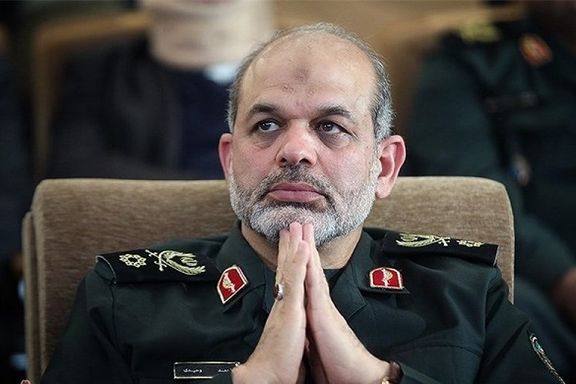
The Argentine government has requested Interpol to issue a red alert for the arrest of Iran's Interior Minister in connection with the 1994 bombing of a Jewish community center in Buenos Aires, killing 85 people.
The foreign ministry disclosed its request on Tuesday while Ahmad Vahidi is traveling as part of a presidential delegation visiting Pakistan and Sri Lanka.
The bombing at the Argentine Israelite Mutual Association (AMIA) is among the deadliest terrorist attacks in Argentina and remains unresolved, with the involvement of the Iran-backed group Hezbollah suspected by both Argentina and Israel.
Following recent court findings that officially implicated Iran and Hezbollah in the attack, the Argentine government is intensifying efforts to bring those responsible to justice.
"Argentina seeks the international arrest of those responsible for the AMIA attack of 1994, which killed 85 people, and who remain in their positions with total impunity. One of them is Ahmad Vahidi, sought by Argentine justice as one of those responsible for the attack against AMIA," said the statement by the foreign ministry.
In addition to Interpol, Argentina has reached out to the governments of Pakistan and Sri Lanka, urging them to detain Vahidi.
The statement from the foreign ministry emphasized the pursuit of justice for the AMIA bombing, describing it as a "crime against humanity" and criticizing the continued impunity of those involved.
The court ruling earlier this month also attributed a 1992 bombing of the Israeli embassy in Buenos Aires, which killed 29, to Iran and Hezbollah, branding Iran a "terrorist state".
Iran has consistently denied any role in the attacks, a position that has contributed to ongoing strained diplomatic relations with Argentina.
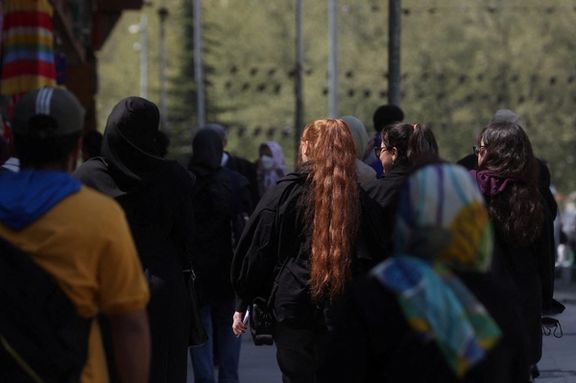
Authorities in Iran have launched a fierce battle with Iranian women over the enforcement of mandatory hijab, a struggle that has reignited widespread condemnation of the government's heavy-handed tactics.
Project Nour, the regime’s new hijab enforcement plan, has seen Iranian authorities escalate their physical efforts to enforce the Islamic Republic’s strict hijab laws. It has led to a surge in violent crackdowns targeting women on Iranian streets.
Earlier this week, Ahmad-Reza Radan, Iran's Chief of Police and commander of the country's Law Enforcement Command, announced that the police would continue the “Project Nour” with the support of the parliament, the government, and the judiciary, with "strength and precision."
In 2010, Radan was sanctioned by the US, EU and the UK for serious human rights violations and his role in the deadly and violent repression of protests during Iran’s 2009 green movement.
As reported by state-run IRIB, Radan thanked his colleagues “who are diligently involved in implementing this plan and are pursuing it with a jihadistic spirit.”
In another significant escalation, the Islamic Revolutionary Guards (IRGC) also announced its participation in the enforcement efforts, forming groups known as "Mehr Ambassadors" to uphold the strict Islamic dress code for women.
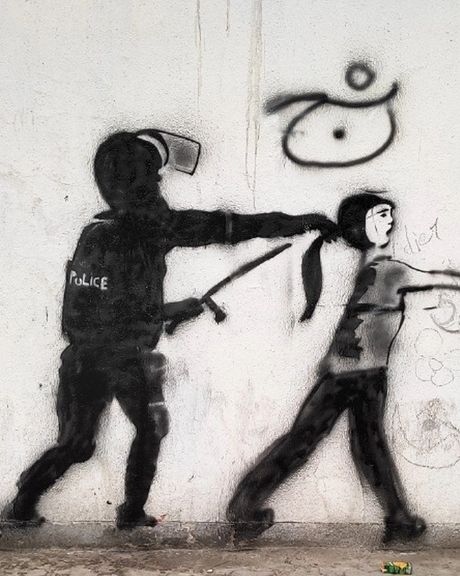
Hassan Hassanzadeh, Tehran’s IRGC commander, emphasized that the group’s rigorous training aims to enforce hijab regulations with heightened intensity in public spaces.
Hassanzadeh was sanctioned in 2022 by Western countries for his role in the violent crackdown on nationwide anti-regime protests – often called the Women, Life, Freedom uprising, sparked by the killing of Mahsa Jina Amini in police custody.
Since the launch of the “Nour” project, reports have emerged detailing disturbing instances of police officers extorting money from women in exchange for leniency, alongside allegations of theft and sexual harassment.
The situation has raised alarm both domestically and internationally, with human rights organizations, student groups and prominent activists decrying the Iranian authorities’ violations of basic freedoms and human rights.
Despite the Iranian officials' scrambling to soften criticism of the hijab crackdown, speeches by Supreme Leader Khamenei and President Ebrahim Raisi triggered a new round of suppression on unveiled women.
The regime’s enforcement campaign has also drawn condemnation from other quarters, including “The Laleh Park Mothers” also known as “Mourning Mothers” – a group of Iranian women whose family members were killed during the 2009 protests.
In their statement, issued on Monday, they condemned the renewed assault on women's freedoms, accusing the government of resorting to brutality to deflect attention from its failures.
"...with the order of Ali Khamenei with the plan of chastity and hijab in the name of “Nour", the war against women is more than intense,” the statement read.
Iran analyst and journalist Morad Vaisi posited that the recent efforts are the regime's attempt to reclaim control over women's rights, stating, “Women occupied many strongholds in the past years and forced the Islamic Republic to retreat, now the regime wants to take these strongholds back from women. Also, Khamenei has a grudge against women and feels inferior.”
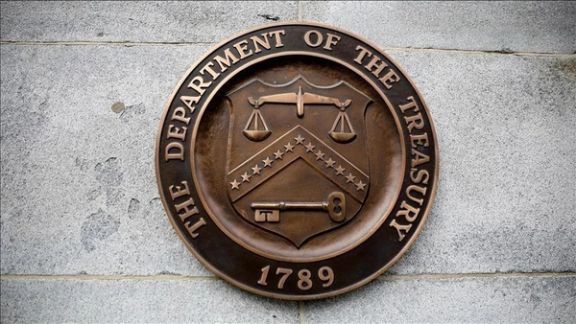
The United States intensified its actions against Iran on Tuesday, imposing sanctions on four individuals and two companies accused of conducting cyber-attacks for the Iranian military.
According to the US Treasury Department, these entities were involved in "malicious cyber-activity" to the benefit of Iran's Islamic Revolutionary Guards Corps' Cyber-Electronic Command (IRGC-CEC).
“Iranian malicious cyber actors continue to target US companies and government entities in a coordinated, multi-pronged campaign intended to destabilize our critical infrastructure and cause harm to our citizens,” said Under Secretary of the Treasury for Terrorism and Financial Intelligence Brian E. Nelson.
State Department spokesman Matthew Miller also said in a statement that Washington “will not tolerate malicious cyber activities victimizing US companies”.
In a parallel move, the US Justice Department and the FBI unsealed an indictment against the four individuals, accusing them of participating in a coordinated hacking initiative starting around 2016 through April 2021. Attorney General Merrick Garland highlighted the extensive nature of the cyber operations directed at American firms and crucial government departments.
The Treasury's statement emphasized the role of the IRGC-CEC in orchestrating the cyber offenses through a network of front companies. One such company, Mehrsam Andisheh Saz Nik, was among those sanctioned. The Treasury underscored that many in Iran might not realize these companies are fronts used to support the military's cyber operations.
The sanctions imposed will freeze any US assets held by the implicated parties and prohibit any transactions between them and US citizens, effectively cutting them off from the American financial system.
Last week, the US and UK unveiled comprehensive sanctions targeting Iran's drone program, in response to Iran's missile and drone strikes on Israel earlier this month.






